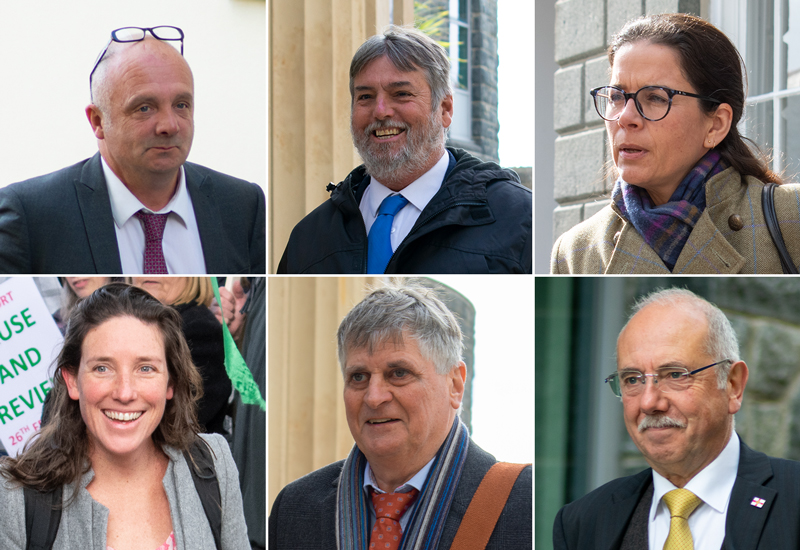


Relying on income tax to plug a projected £85million annual hole in States’ finances could require a 60% tax rate on income above £60,000 a year.
The Policy & Resources Committee has dismissed that option as unrealistic. But its treasury lead, Deputy Mark Helyar, laid the figures in front of a scrutiny public hearing as the Committee continued to prepare the ground for another attempt to get a goods and services tax [GST] through the States in January.
“Basically, if you’re looking at an income tax and social security solution, that would be 60% income tax for everyone over £60,000 plus social insurance. If you’re self-employed, that’s 13% - you’re looking at a 73% tax rate,” said Deputy Helyar, pictured (top, right).
“In the tax review, we’ve fired around all of the opportunities, if we can call them that. None of them are particularly pleasant.
“The proposals that we’re narrowing in on now are still not something any politician would want to impose on the population. The alternative to that I’m afraid is cuts – significant cuts in public services.”

Pictured: The Policy & Resources Committee is warning that some public services could face major cutbacks if deputies reject or delay tax rises to be proposed in January.
The Committee is believed to be considering how it can force States’ members to make a straight choice between GST of up to 8% or cuts in public spending of up to 15% to balance the books.
“One of the potential structures of the policy letter when it comes back to the States will be either vote for the tax or vote for the cuts and the schedule at the back will be a list of those services that would be lost as a result of not making the decision,” Deputy Helyar told the scrutiny hearing.
“I don’t think we can have the discussion anymore in the abstract. It would have been ok to have that discussion 20 years ago when there was some leeway in the accounts. There is no longer any fat."
The Scrutiny Management Committee panel asked Deputy Peter Ferbrache, the President of the Policy & Resources Committee, what would happen next if the States rejected substantial tax increases in January.
“I think what would happen is that we – Policy & Resources – would have to come to every States’ committee and say: you know what decisions we’ve just made - this is the position – this is the likely income going forward in future years - we’ve got to sit down with you and you’ve got to come up with a 5% cut or a 10% cut," said Deputy Ferbrache, pictured (top, left).

Pictured: Deputy Peter Ferbrache said that failure to agree tax rises would leave him with no option but to visit the Presidents (above) and members of Principal Committees and require them to identify their least worst spending cuts.
Deputy Helyar appealed for support from all States’ committees and deputies to restrain expenditure. And despite the Committee being on the verge of re-submitting proposals for GST, he said that big tax rises would be “a huge burden” and “potentially crippling” to Guernsey’s economy.
Deputy Yvonne Burford, the President of the Scrutiny Management Committee, asked why the Policy & Resources Committee was proposing budget increases of nearly £50m for 2023, above the rate of inflation.
In reply, Deputy Ferbrache said: “There are those costs. It’s not wasted. It’s not as though the money is being used frivolously. We look at every increase and expenditure request that comes to us with real rigour. It’s very difficult to refuse many of them because they are so well researched, presented and they are so meritorious.”
Deputy Ferbrache, who was previously a States’ member between 1994 and 2000, was elected for a second spell in 2016, since when his views on public spending have changed.
“When I came back into the States six and a half years ago, I had this view that there was an overblown civil service,” he said.
“That there were people sitting around – not quite under sunlamps all day or having a little snooze and going for a coffee break but not far off that. I can say, in particular with knowledge gained over the last two years in my current position, that the resources are stretched to the absolute limit.”

Pictured: Deputy Peter Ferbrache said that his view of States' officials had changed since he was elected for a second spell in the States in 2016.
Another member of the scrutiny panel, Deputy Adrian Gabriel, asked what measures the Policy & Resources Committee was considering to alleviate cost of living pressures on individuals and families.
In reply, Deputy Helyar said: “One of them in the budget was to pause [withdrawing] mortgage interest tax relief, which has been phased out for many years. The control of interest rates is the Bank of England’s job and it’s out of our hands. If mortgage rates rose significantly, we would have to consider reimplementing those rates to ensure…people aren’t squeezed in the middle.
“Very quickly it will be those with mortgages at the lower end of the earnings scale that will be squeezed and often particularly those with families. Those would be the ones to be targeted. I think we’ve agreed – and the Committee for Employment & Social Security in our discussions with them – that if we’re going to provide support it should be focused on those who need it rather than broadly.
“General cuts in taxation of certain types are not helpful because they tend to benefit the wealthier more than they do those who need it more. We would generally look to things that are more targeted.”
Deputy Ferbrache repeated criticism he has made before about States’ policies on “middle Guernsey”.
“I would like to see the States – which States’ Assemblies going back haven’t done – have a look at middle Guernsey. Have a look at what they’re going through and have been for a long time. What have we done for them? Absolutely nothing,” said Deputy Ferbrache.
“We’re talking about people in poverty and people on benefits and of course they have to be provided for, but we also have to make sure we consider the people who are out there earning money, educating their kids, paying for their kids perhaps to go to school, paying for their mortgages or their rents, perhaps a couple working really hard. Not just those who are in poverty. We look at the people who are trying to advance their lives.”
States' spending set to increase by nearly £50m next year
Toughest situation for "donkeys' years"
2023 Budget proposals out today
"We're nearing the day that we will have to turn off services"
P&R tight-lipped on whether tax proposals remain on track
Firm appointed to review whether companies could pay more tax
FOCUS: Opposition across the States to P&R's latest GST plan
EXPLAINED: Why the States' leaders believe GST is needed now
Comments
Comments on this story express the views of the commentator only, not Bailiwick Publishing. We are unable to guarantee the accuracy of any of those comments.